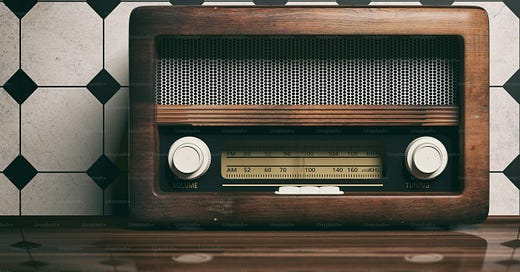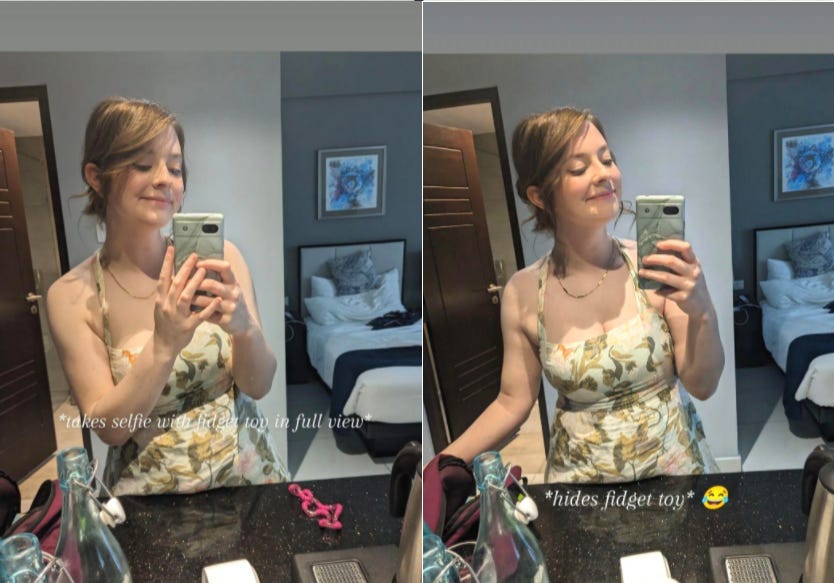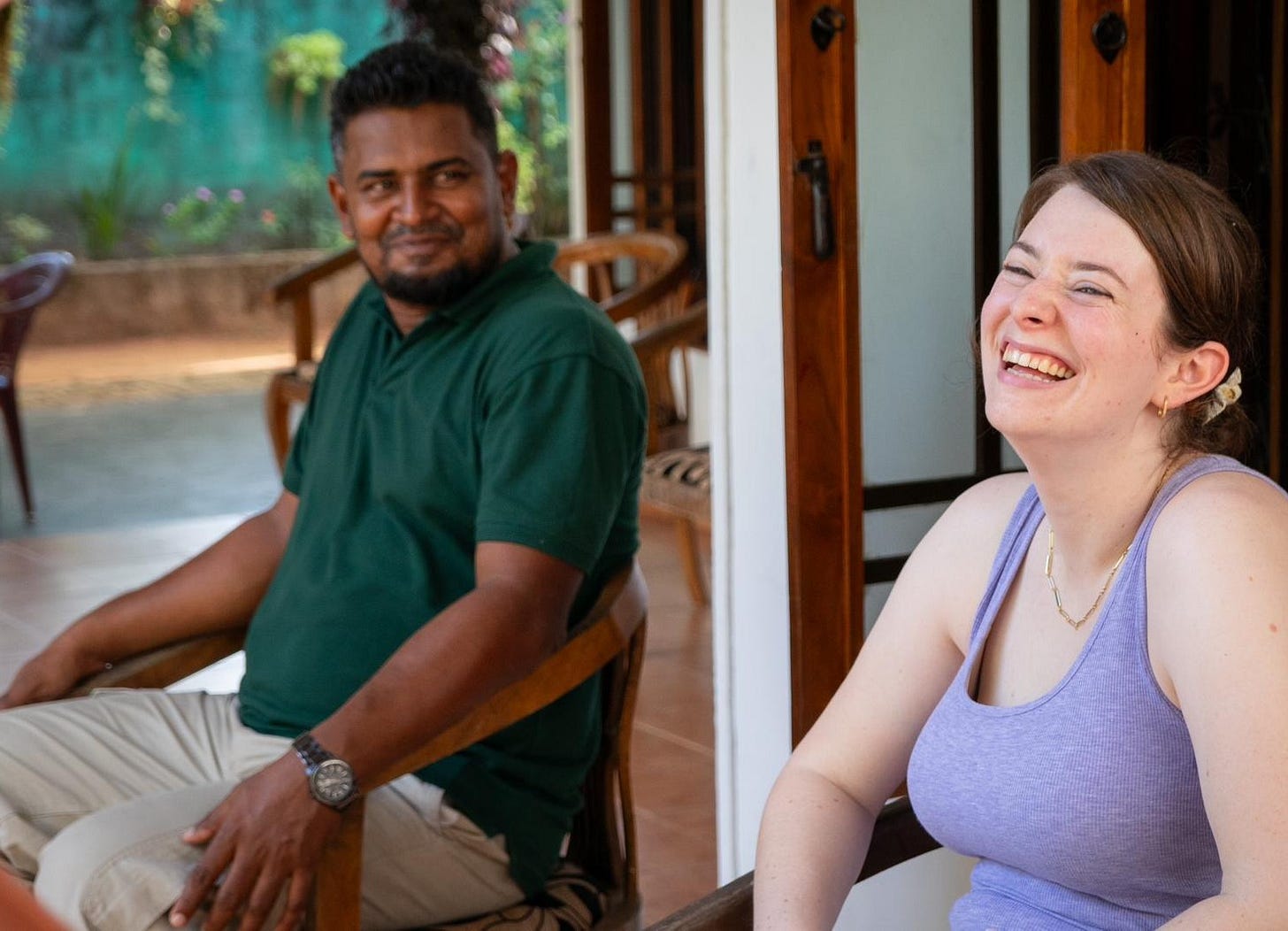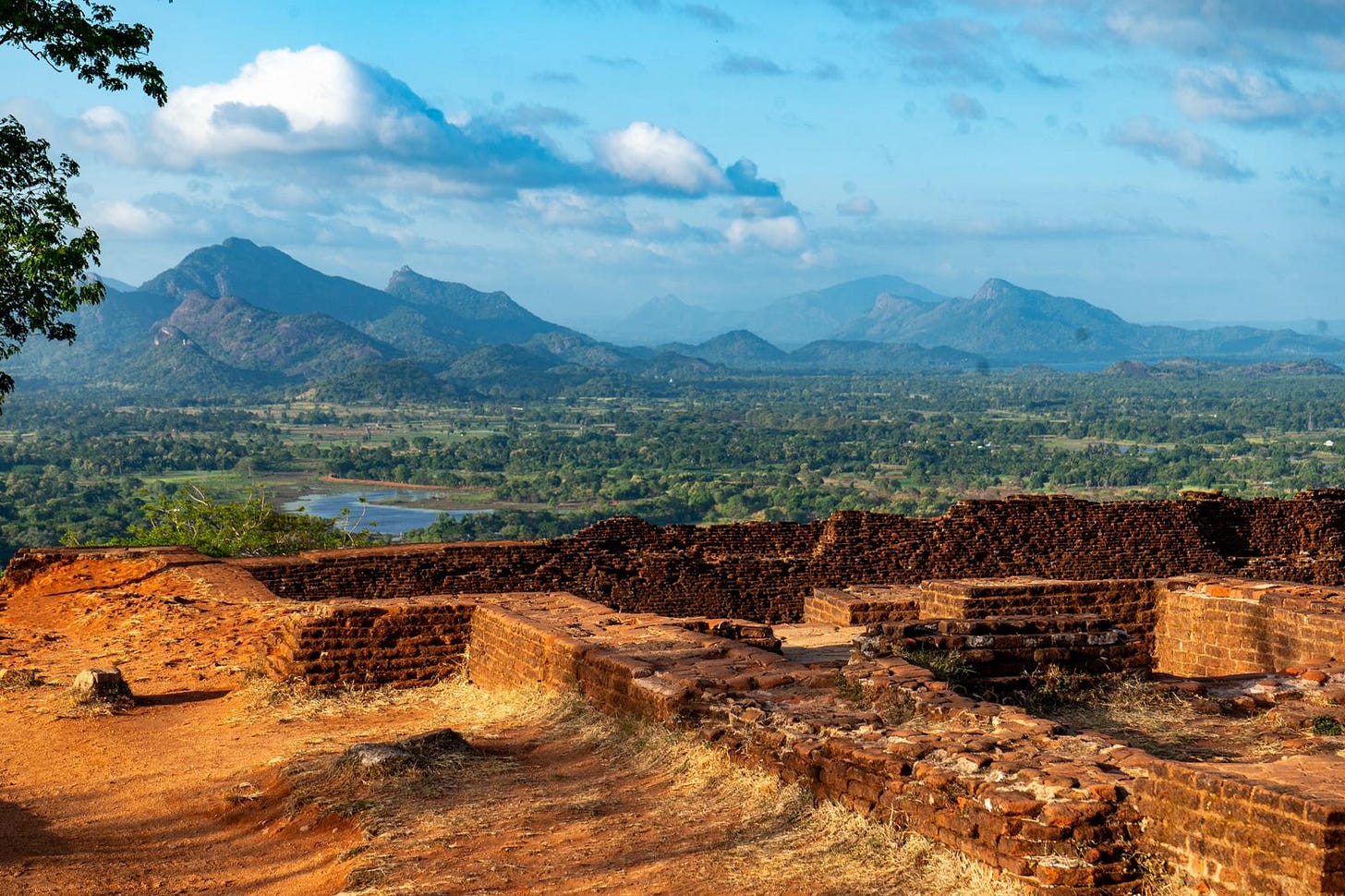Hi reader,
How are you travelling?
I’ve been slightly preoccupied journeying around Sri Lanka on a literary tour with a group of kind, thoughtful, brilliant, awesome nerds, led by the fabulous Bri Lee.
We started by the sea in Colombo, bussed down to Kandy - home of the Temple of the Tooth, spent some time safari-ing in Yara and passed through the Dutch Fortress of Galle on our way back to the capital to round off the trip.
In this edition, I’d like to experiment a bit by sharing some of the Morning Pages I wrote during my travels à la The Artist’s Way, reflecting on my first overseas trip post-ADHD diagnosis, making space for chronic pain and some of the revelations that emerged along the way.
It’s a pretty personal one - I’m literally sharing my diary entries with you here! And there’s more mountain imagery than I care to admit… So be kind and leave a comment if anything resonates with you.
Enjoy :)
PS. There are some links sprinkled throughout the entries which explain some of the symptoms of the ADHD experience for those who may be interested in learning more.
Morning Pages 13.9.24
I’d like to write about the process of unmasking on the trip.
How would it feel to shed the layers of adaptation and conditioning and social etiquette and just be?
At first, I thought of unmasking as just “being myself”, indulging urges to stim and expressing my thoughts unabashedly.
That is an aspect of the process, but a much more gnarly part is learning to notice where I am, name what I’m feeling and do the work of actually meeting that need - which is ironic because more often than not, the thing I require is down time.
A big part of setting myself up for success with the increased concentration of socialising on the trip is being intentional with my time, but I’ve found the practice of acknowledging my limits more challenging than I thought it would be. Having to sit with feelings of discomfort - and the shame of needing frequent breaks to function in the first place - is strange and unfamiliar.
Usually, I can distract myself with work or music or Netflix. But here, away from the noisiness of life, I’m made to pay attention to the way I’m feeling and be honest with myself about what I need.
Because if I don’t, I’ll miss out on precious holidaying.
It’s like being forced to stare into one of those magnifying mirrors mounted in the corner of every hotel room, amplifying my pores and split ends, casting an ugly yellow light on my already-sallow skin. Yuck.
Last night before dinner - the first gathering of the entire group - I was particularly nervous about how I’d show up. I paced nervously around my hotel room, curling and re-curling my bangs, turning over the different responses that might arise in response to my stim toy.
More so, I was afraid of the embarrassment of appearing foolish when I inevitably misinterpreted something or said the wrong thing or had to pull back from the conversation to process sensory input without appearing rude or disinterested.
Before discovering my neurodivergence, masking was implicit in my everyday behaviours. I would unconsciously make accommodations for myself and compensate for my limitations without even realising I was doing it. In a way, it’s much easier when you don’t have an awareness of your shortcomings. Ignorance is bliss, after all.
Once I began to recognise these patterns in myself - a bouncing leg here, an impulsive comment there, suppressing a forceful surge of valid, but misplaced emotion - it became impossible not to scrutinise every interaction through that lens and try to figure out how to operate “correctly”. It was like I’d noticed a fault in my vision, but couldn’t get into the optometrist to get glasses and see clearly like everyone else.
I don’t know that I ever will.
My hope is that, with time, the extra energy I spend when I notice myself masking and have to figure out how to act authentically, while maintaining socially acceptable behaviour, will lessen. Or, at the very least, if the self-consciousness doesn’t fade, that I can make room for the difficult feelings that arise and find a way to accept this part of me without shame.
~
Morning Pages 14.9.24
One of the girls, Elsie, took a photo of me at lunch yesterday, head tilted back, delighting in an anecdote shared over our curry feast.
I sent it to mum, concrete evidence of my happiness.
When I eventually told her about my diagnosis, I cried at the part when I explained the exponential impact of starting stimulant medication.
“I didn’t know I could just wake up and be happy,” I said.
Wiping away the tears with a snotty tissue, I added the caveat that, while I had experienced joy in my adult life, it was so often weighed down by mental clutter that I’d lost the ability to be present and embrace it.
“Now, I feel like I get up with a clear mind and there’s actually room to notice and enjoy all the little things again.”
There was a noticeable shift at work, too. Where previously I felt like I was rationing my energy to survive the day, I now had a full tank to expend at my whim.
Often, I’d find myself collapsing in a heap after spending hours marking an entire class of essays in one hit. (It usually takes about 3 days). It was exhilarating, but dangerous - like getting my license back after being suspended for reckless driving.
One of my colleagues observed my newfound drive and commented, “It’s like first year you!” referencing the relentless verve of my passionate, yet naïve, graduate self. A P-plater, if you will.
That’s when I became aware of a new challenge: how do I regulate an energy source that feels so good while I’m actively enjoying the high?
Reflecting with my psychologist, I realised a layer of my cognition had been altered - in a good way. Generally, a constant commentary streams through my ears like a personal radio station, narrating my perception of the world. With the medication, the voice was turned down to a low, muted hum, echoing from a room down the hall.
I’d become so accustomed to its incessant drawl that the removal was jarring. While I now had a new clarity, presence in the current moment, I was missing the acute awareness of my senses I’d always relied on.
The altered setting of my radio also presented challenges in regulating my emotional wellbeing.
Naturally, the little voice commentates my innate reactions to every conversation. It surveys physiological responses and makes mental notes for future reference - a very conscientious inner monologue.
It’s pretty helpful in teaching, observing shifts of energy in the classroom, planning ahead. But after moving out and losing the structure that had propped me up, my symptoms became more pronounced. My executive function was overloaded - the radio was blasting at full volume 24/7, making it tricky to act on those observations with intention.
When a student flares up after I set a boundary, I’m now calm and centred. I can respond, think things through rationally, rather than reacting off the cuff - a welcome change compared to the screaming match that filled my classroom with heavy air when a Year 7 refused to move seats last term and the heaving mass of sobs found on my office floor after a colleague slurped her noodles too loudly…
Rather than noticing every sensation of the interaction as it absorbs into my skin, I can now focus on the moment as it unfolds. But later, when the feelings of unease unfurl in my stomach, I have to tune into a specific frequency, twiddling the dials with a finesse I haven't yet mastered: Why am I feeling anxious little radio?
~
Morning Pages 15.9.24
There’s always something so profound about climbing a mountain. The sweat pooling at the base of your spine. The ache of your calves straining at each step. The rush of relief when you reach the top, escaping with the final, heaving breath.
This morning, we climbed Sigiriya Rock. From when I rose at 4am right up to the foot of the climb, I was convinced I would fail. That my muscles would give out and I’d miss the sunrise.
Now, I’m sitting atop the Lion, gazing out at a spread of trees and lakes and mountains strewn across the morning landscape.
Nice.
Word has spread amongst the group about my pain condition.
“Would you like to sit down?”
“Do you need any Panadol?”
“Is there anything we can do to help?”
The sentiment is comforting, of course. Validating, even. To know that people see and acknowledge my struggle.
But the underlying message that seeps between the words is unsettling:
“You are weak.”
“You need help.”
“You’re broken.”
It’s a confusing duality. I’m constantly questioning the integrity of my condition, while trying to convince myself it’s real; that claiming a spot at the front of the bus to stretch my legs and sitting down when the relative travel guide goes on a little bit too long is necessary. Deserved.
The surge of endorphins raced through my veins about halfway through the climb. I felt powerful. Inviolable.
My body CAN do anything.
As I sank into the sensation, I willed the ache in my muscles to fade.
Rather, I found it existed with my breath, pulsed alongside the rays that warmed my skin. It spread through my joints just like the breeze cooling my neck.
A complicated, but strangely comforting, duality.
~
Morning Pages 17.9.24
Yesterday was a rough mental health day.
The combination of chronic pain and the consistent attention to masking and unmasking gave way to a cycle of overthinking about how I’m received by the group. My brain kept telling me no one here likes or cares about me, despite evidence of check ins and tender exchanges throughout the day.
My mind and my body felt heavy and loaded with sludge, requiring extra effort to push through the sediment.
I found it hard to create space around it, as though the heat had baked the tension into my body until it fused and dried between my bones.
Maybe I can find some tools to scratch away the caked dirt or a warm liquid to soften the clumps until they wash away.
I need to look within. To sense the spaces between the debris and breathe life back into the cavity until specks of light break through.
There’s always room around the pain and the muck. I’ve felt its expanse stretching out beyond the edges of my vision. Just like the view at Sigiriya, it has endless capacity to hold all the layers of my experience.
I need to connect with its berth and release the strictures that have folded around me, to feel its reach and loosen my grip so I can welcome all the parts of me that live in this home.
~
Morning Pages 22.9.24
When you’re out of your natural environment and pushed past your comfort zone, the awareness of your body becomes more acute.
During my trek in Nepal, I could feel my pack getting lighter with each climb. It was as though it had begun full of stones - one released each day, descending into the canyon below, allowing me to float just a little higher. My calves grew stronger, pushing me through the strain to reach every peak. My lungs became wider, holding air and dust and the will to charge forward, able to withstand more than I’d believed I could.
Here, as we embark on the final stretch of our journey, I’ve come to feel the weight of every exchange, a token slotted into a machine, the number of lives dwindling throughout the day.
I began the trip with a goal to accept my limitations and find assurance in the validity of meeting my needs. I realised that, along with identifying the necessary accommodations, the difficult feelings of enacting them would be an additional hurdle to leap.
But as the trip went on and the early mornings and long bus rides took their toll the need for rest became fundamental, second nature.
There’s no shame in claiming what you need.
Ironically, I’ve found there’s a necessary rigor required to promote joy and connection. You need to keep a strict schedule to actively create space for rest. Who knew?
Maybe my personal radio will adapt to resemble the voice on the other end of the Metro button at the train station: “The next rest break on the Emma line will arrive in 18 minutes. Be sure to take your medication and keep behind the yellow line.”
When you’re out of your natural environment and pushed past your comfort zone, the usual rationalisations are absent and you’re presented with the opportunity to adjust your habits.
Let’s hope my awareness continues to grow, the shame fades into the background and the habits I’ve developed become touchstones in my every day life.












Such beautiful writing Emma, inspiring and hopeful. Your words took me on the journey with you, up mountains and into unknown places, and always with a deeper understanding of self. I too love hiking and climbing mountains and as you said it is in these places that you can learn new habits, break old boundaries, and finally be yourself. 🙏
Amazing reflections Emma 🧡 a brilliant articulation of some of what I felt as well travelling while managing neurodivergence. You’re a fantastic writer